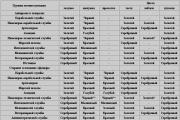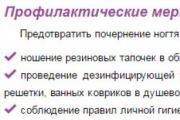Application to the social protection authority for the poor. List of documents for processing benefits for the poor
As practice shows, few families know that they belong to the category of low-income people. And even more so, they have no idea what benefits and government support they can count on. Today we will try to bridge this gap and fully illuminate the issue.
Difficult situation
Our state provides significant support to those families who find themselves in difficult situation. If you are low-income, you can fully count on it, but first you need to confirm your status. But how to do this correctly and without going to the social security authorities several times?
Each region of our country has a certain minimum living wage. It varies within certain limits for different subjects of the Russian Federation, but always has an exact expression.
For example, in the Moscow region this value is slightly more than 10,000 rubles.
Determining whether your family can be considered low-income is very easy. Take your total family income for one calendar month and divide it by the number of members in your social unit. If the number is less than the subsistence level established in the region, the family is considered low-income.
But just counting is not enough. Now you need to contact the social security authorities with an application for recognition of your status. In order for everything to go well, you will need documentary evidence of all income. As a rule, these are Form 2-NDFL certificates from places of work, or a certificate of registration as a non-working citizen. If you are babysitting, there must also be a document confirming this fact.
Now there's another one important point. It is necessary to have an accurate understanding of what a family is in general.
In our state, this concept includes the following groups of people living together:
- married couples with children;
- single married couples;
- single parents and their children.
Adopted children always have equal rights to their relatives. And one more thing important condition: The marriage must be registered. Otherwise, the family will not be recognized as such.
Concepts are often confused. Large families are automatically equated with low-income families, but in practice this is not the case. Of course, where parents have many children, the average per capita income is often lower living wage, but not always. If this condition is not met, then even those families with more than three minor members are not recognized as poor.
It also happens the other way around. There are sections of society in which, due to life circumstances, even two adults, without children, do not earn the required amount. Then they are recognized as low-income.
Only after official confirmation of status low-income family you can count on government support. To do this, it is important to conclude an appropriate agreement with the social security authorities.
Registration of status

So, if, based on income level, your family can qualify for low-income status, this must be formalized by law.
You will need to collect a certain package of documents:
- Certificate of family composition. Issued at the passport office at the place of registration. It is also necessary to note the degree of kinship of each person in relation to each other. Remember that only spouses and their children under 18 years of age are considered a family. Grandparents, aunts, uncles, etc. not included here.
- each capable member. Form 2-NDFL is sufficient, but sometimes it may be required additional documents(for example, information about the amount of the pension, the amount of the scholarship, etc.).
- Identification documents for each member. For persons aged 14- summer age– passports, for younger ones – birth certificates.
- Certificate of marriage or divorce;
- Account in Sberbank. It is to him that everything will be transferred due compensation and payments.
All documents have been collected. Where should you start with your design? Contact the regional social security department and write a statement providing all necessary documents. One point should be taken into account: all capable family members must be employed. If someone is not working, he is required to provide a certificate from the Employment Center. And from women who care for a young child - confirmation of this circumstance.
All documents must be submitted directly to the social security officer. If any questions arise during the process or something is unclear, ask. In this matter, it is better to clarify everything and find out right away, so that there are no problems later.

Now we have reached the very important issue. What compensation to low-income families are entitled to from our state in 2019? Although the list is impressive, different regions it may vary. The fact is that all benefits and payments are not only federal, but also regional in nature. Therefore, it is advisable to clarify the exact list directly in your constituent entity of the Russian Federation.
We will list only those that are possible throughout the country:
- One-time payment. You can count on such assistance once every quarter (4 times a year). Its value will be calculated directly by the city administration, taking into account the severity of the situation of the family as a whole. Approximate sizes - from 100 to 1500 rubles per each member.
- Housing subsidy. Its purpose also depends on the situation in which the family finds itself. Most often provided to orphaned children or single parents. It has a targeted direction and is provided once every six months.
- Compensation for travel on public transport. Low-income families have the right to registration free travel. Some are given the opportunity to stay for free. But this is also decided in each specific situation.
- Pregnant women from such families have the right to receive monthly monetary compensation intended to pay for necessary medications and medical services – 580 rubles. Required condition: being registered. Nursing mothers can also count on the same amount monthly. It is prescribed until breastfeeding ends.
The remaining cash payments concern children living in low-income families. We will talk about them a little below.
Benefits

In addition to monetary compensation, such families are entitled to certain benefits.
Moreover, you can count on them in any region of the Russian Federation:
- Tax benefits. First of all, one of the parents of a low-income family is completely exempt from monthly withholding income tax. Also, taxes will not be imposed on all funds that are accrued within social support.
- Housing subsidies. Each family pays public utilities calculated at no more than 22% of the total income of all members. This rule applies to both apartment owners and those living under a social tenancy agreement. Low-income families pay significantly less according to special calculations and regional coefficients. The benefit is issued once every six months.
- Free legal advice. Legal assistance, including protection in trial, low-income families receive free of charge.
- Parents have the right to get a job that offers preferential benefits working conditions, lowering the retirement age, as well as the possibility of exemption from paying the business registration fee.
- Children have the right to be enrolled in a kindergarten out of turn (from the age of three), free meals in the school canteen (breakfast and lunch), free dispensing of medications prescribed by a doctor (only for children under 6 years old), receiving sports and school uniforms, purchasing a ticket to places of treatment or recreation for one child and accompanying adult with a discount 50% (once a year).
- The entire family as a whole has the right to receive free emergency summer cottage, mortgage for preferential terms, free visit cultural institutions(museums, exhibitions, parks) once a month.
In some regions, local benefits are added to these benefits; their availability must be checked with your social security department at your place of registration.
Payments

Basically, cash payments provided to low-income families concern children. The amount varies in different regions, so it is impossible to give its exact value. But the largest allowance can be received for a child aged from one and a half to three years. If there is only one parent in the family, then the amount will increase.
In many constituent entities of the Russian Federation, special targeted payments are expected. For example, dedicated to the new academic year (for the purchase of necessary literature and stationery), promoting nutritious nutrition and treatment of pregnant and lactating women, etc. Students living in such families receive a social scholarship from the state. This applies to both those who study at universities and students of colleges and technical schools.
If there are children
Our state is trying to provide maximum support to the most vulnerable citizens - young children. It is for them that most of the additional payments and compensation. So, what can a low-income family with children expect?

Cash payments:
- Monthly benefit for a child up to 3 years old. It is issued for the whole family, so only one parent can receive it. The size depends on the age of the child: from one to one and a half years, from one and a half to 2 years, from 2 to 3 years (on average, from 500 rubles). It is necessary to re-register every six months, the amount is calculated for each child in the family.
- Payment for the third child (and all subsequent ones). If a low-income family also has many children, it is entitled to monthly payments equal to the subsistence level. It is paid until the child reaches the age of 3 years, then recalculation occurs. Reissued (confirmed) once every six months.
- If the family has children over 3 years old, they are also entitled to monthly payments. They already depend specifically on the age of the child and are calculated directly by social security.
- Temporary benefits for schoolchildren. To the beginning of a new one academic year in many regions it is provided lump sum allowance in size about 500 rubles. There is also help for first-graders - approximately 1500 rubles, payment period from August 1 to December 1 current year(to receive it, bring a certificate stating that the child is enrolled in 1st grade).
- Benefit for children of military personnel. If one of the parents in a low-income family is conscripted, the children are also entitled to certain payments. The amount is about 10,000 rubles and is transferred monthly until the child is one and a half years old.
In addition to monetary benefits, children from low-income families Others are also provided:
- related to admission to universities;
- compulsory dairy kitchen for children under 3 years;
- free food or a certain package of products;
- the possibility of free travel on public transport;
- free meals in the school canteen.
All benefits listed are not lifetime, and in some circumstances, they are canceled. Below we will look at which ones.
End of support
If you have received the status of a low-income family, be prepared to confirm it with documents every six months. To do this, you will have to bring proof of income for the last 3 months. If you do not do this, all accruals will be automatically suspended.
There are other options for ending support. If one of the spouses (or both) received more than high paying job, you need to notify the social security department about this. Your income will be recalculated again and, provided that you contribute to the subsistence level, your status will be removed. The same can be said about the situation when a woman returned to work after maternity leave.
The government is trying to support families who find themselves in difficult financial situations. Help is provided not only through payments, but also through the establishment of special benefits.
And if suddenly your family is in a difficult situation, it makes sense to apply to the social security authorities at your place of registration and improve your situation.
Allowance for low-income families: example of calculating family income + 10 due payments +10 necessary papers+non-monetary forms of support.
Not every family in Russian Federation looks confidently into the future. The reason for this is low income, or even unemployment, poor living conditions, inability to pay for children’s education, etc.
In order to provide support for such people, various benefits for the poor have been approved at the state and local level.
Don't miss the opportunity to get additional funds for your family.
But let's first define who can be called poor.
Benefits for the poor? Who are they anyway?
Those families whose income is less than the subsistence level per person are considered low-income and eligible for benefits, but the following nuances must be taken into account:
- Income is calculated based on data for the last 3 months before applying for benefits;
- Income is considered not only official salaries from the place of work, but also other payments - pensions, various rewards and fees, income from the use of one’s property, for example, from renting out a garage or a country house.
- The subsistence minimum (LM) is set in each locality (region), depending on the amount of wages and pricing policy. The largest are in Moscow and St. Petersburg. Every quarter, local authorities revise the PM upward.
Here, for example, is data on the size of the PM for the 2nd quarter of 2017 for the largest regions of the Russian Federation:
| City | Working population | Pensioners | Children |
|---|---|---|---|
| Moscow (data for 1st quarter) | RUB 17,642 | RUB 10,695 | RUB 13,441 |
| Saint Petersburg | RUB 11,830.3 | RUB 8,591.6 | RUB 10,367.9 |
| Ufa | RUB 9,498 | RUR 7,297 | RUB 8,892 |
| Novosibirsk | RUB 11,854 | 8 9500 rub. | RUB 11,545 |
| Nizhny Novgorod | RUB 10,033 | RUB 7,722 | RUB 9,612 |
CALCULATION EXAMPLE. Let’s say the Vorontsov family consists of 4 people - two employed adults (husband and wife), a retired grandmother and a 10-year-old child.
The husband received 20 thousand rubles. salaries in April, 22 thousand rubles in May and 18 thousand rubles in June. Total - 60 thousand rubles.
At her job, my wife received 27 thousand rubles in April, 20 thousand rubles in May, and 19 thousand in June. Total – 66 thousand rubles.
During these same months, my grandmother received 8 thousand rubles. pensions, that is, for a total of 3 months: 8 * 3 = 24 thousand rubles.
The child, naturally, did not earn anything during this time. The family had no other income.
First, we calculate the total amount of family income for three months: 60+66+24 =150 thousand rubles. Then for 1 month - 150/3 = 50 thousand rubles.
Since there are 4 family members, then each one receives 50/4 = 12.5 thousand rubles. per month.
The Vorontsovs live in the Altai Territory, where the monthly subsistence minimum per resident is, for example, 17 thousand rubles per month. As we can see, their incomes are lower. This means that they can qualify for all types of assistance provided for low-income people.
Important ! Families who find themselves without money for reasons beyond their control are recognized as poor. That is, no one will allow you to live on social benefits, if you do nothing to earn money yourself or, even worse, drink or use drugs.
You will also be denied benefits if you submitted papers with false information.
What documents do you need to go to Social Security to receive benefits for low-income families: 10 necessary papers
So, have you recalculated your monthly income per family member ten times and come to the conclusion that you can safely classify yourself as low-income?
Then, to receive all benefits for the poor, go to your local social security office with the following documents:
- internal (not foreign) passports of both parents (also take photocopies);
- marriage certificate or divorce certificate if there was a divorce and the family is incomplete;
- Saints of the birth of all children under 18 years of age;
- a statement that you are asking to recognize your family as low-income. You can either write it by hand or type it on a computer. It is best to take a sample at the place where the application was submitted in order to correctly fill out its “header” (to whom it is submitted);
- documents for family property, such as an apartment, car, land, etc. Taken into account when calculating monthly income for each family member;
- certificates from the place of service (work) of both parents indicating their salary for the last 3 months;
- , which states who the family actually consists of. It is taken from your housing office, homeowners association, management company - depending on the form of management of the apartment building. Those who own a private home can get the paper from the local administration.
- a certificate from the employment service and, possibly, work book if someone in the family is registered as unemployed;
- a certificate stating that someone from your family, if this is the case;
- a savings book or a regular bank card to which cash benefits will be transferred to you.
No later than 10 days after submitting these documents, local social security workers must decide to give you low-income status and issue an appropriate certificate.
Benefit for low-income families: 3 lump sums and 7 monthly payments you can count on
5 such benefits for the poor, which are paid only once.
- Payment upon registration with antenatal clinic. When a pregnant woman applies before her 12th week, she is paid about 600 Russian rubles.
- Social assistance for the birth of a baby is approximately 15.5 thousand rubles. In some areas it may be more.
- On last trimester during pregnancy, spouses of military personnel must be paid 24.5 thousand rubles.
8 benefits for the poor who pay every month, or “Don’t hang your nose, midshipmen.”
- Payment for the child until he reaches 1.5 years of age. Paid regardless of the number of children in a low-income family. Issued to one of the parents in the amount of 40% of his monthly earnings.
- (until he turns 3 years old) in the amount of the minimum cost of living in the region (read the article above). They pay only for the third and subsequent children.
- A benefit for each warded and adopted child (regardless of the number) in the amount of the monthly minimum (about 15 thousand rubles, the exact amount depends on the region).
- The monthly payment for the loss of a family breadwinner will be about 2 thousand rubles
- Also, conscripts from low-income families are entitled to benefits for children under 5 years of age (approximately 10.5 thousand rubles)
- The monthly maternity payment to low-income women is about 550 Russian rubles. Paid by the state if a pregnant woman finds herself unemployed for reasons beyond her control - closure of a company, staff reduction, bankruptcy, etc.
It must be remembered that if a pregnant woman goes on maternity leave from work (official), then the employer is obliged to make monthly payments. The amount depends on the salary expectant mother before going on maternity leave and the minimum cost of living in the region.
- Regional benefits for the poor. In addition to the social benefits listed above, additional money may be paid from the local budget. You just need to find out from the local administration (city or district) whether any other programs to support low-income citizens have been adopted in your region.
Basic benefits for low-income families in non-monetary form: what else can you count on?
The authorities help low-income people not only in the form of cash benefits, but also a number of benefits for children and adults:
1) Purchase of housing and payment of utilities.
- Low-income citizens can queue up for social (free) housing and, in order of priority, receive it for free under a social tenancy agreement.
- If a family is officially recognized as low-income, it can also count on mortgage benefits, which implies a low loan rate and affordable housing costs.
- Poor people can receive a subsidy if more than 22% of the family's income goes to pay for utilities.
2) Taxes.
- If a low-income person decides to register individual entrepreneur, he is exempt from paying state duty for this.
- From one-time social payments, for example, with income tax individuals not counted.
3) Admission to a university.
In addition to benefits, a child from a low-income family can enter a state university without competition if he:
- not yet 20 years old;
- passed the Unified State Exam and, if necessary, scored a minimum score (passing) in the entrance exams;
- the only parent in the 1st disability group and he is the only breadwinner in the family;
Child benefits for low-income families.
Who are they supposed to rely on? social benefits? Purposes of provision
state aid.
4) Support for children from low-income families.
- The state provides such a child under 6 years of age with the necessary medications free of charge.
- The baby must be admitted without waiting in line kindergarten.
- A schoolchild from a low-income family, along with all the benefits provided, also has the right to:
- eat 2 times a day for free in the school canteen;
- get it for free school uniform and sports kit;
- purchase a transport pass in your city/region with a 50% discount;
- visit once a month without money state museum, theater, exhibition;
- if necessary, once a year, undergo free recuperation at a sanatorium-preventorium.
And these are only federal forms of support for the poor. Each district approves its own additional ways support families who are in difficult financial situations.
So you should check with your local social security office for the latest information on benefits for low-income families in your area. Don’t be shy to ask the experts any questions you have.
Today, many families live in Russia intermediate level whose income is less than that fixed at the state level and recently equated to the minimum wage. Such families are recognized as low-income and are entitled to financial assistance from the state, in accordance with current legislation.
In order to the family was recognized as poor You should contact the social protection authorities located at your place of residence. On this type payments can be claimed both in full and single-parent families. It should be taken into account that each Russian region has its own level of living wage. For this reason, in different regions, families whose income levels differ from each other may be classified as low-income families.
What assistance do low-income families receive in 2019?
For example, in Moscow, according to Moscow Government Decree No. 1465-PP dated December 4, 2018, the cost of living for working population equals 18,580 rubles for 2019 (per capita - 16,260 rubles; for pensioners - 11,505 rubles; for children - 13,938 rubles) and if for each family member the amount is less than the agreed amount, then you can contact the social care authorities to obtain the status of a low-income family.
Family income, along with wages, includes all available social payments. Since the level of the cost of living is recalculated at least once a quarter: it is necessary to provide confirmation of the income level of the entire family once every three months.
When a family is recognized as low-income, it has the right to apply for subsidies and related benefits. Strictly speaking, the state provides such a benefit - compensation for the difference between existing utility costs and the standard cost of housing and communal services for each family member. Standards are set individually in each region, so the amount of compensation payments will vary. If you turn to current legislation, That maximum size utility bills should not be higher than 22% of family income. In the case where the level of payments on bills is higher, then in this case the family recognized as low-income receives housing subsidies.

The amount of cash payments (benefits) to low-income families with children also depends on the region of residence. Cash payment(benefits), issued once a month in Moscow, is: children whose age ranges from 0 to 1.5 years are entitled to the minimum wage (13,938 rubles per month at the beginning of 2019).
A low-income family has the right to apply for payment of financial benefits once a year if it takes care of writing an application to local authorities social services. In various regions, along with this payment, you can apply for other types of social assistance:
- Receipt free food at school
- provision of school uniforms
- free travel on public transport
What documents are needed to recognize a low-income family?
First you need to write a corresponding application. If we talk about Moscow residents, then they have already received this application form. If you need a sample of how to correctly fill out this application, you can get one from the local social welfare office. To your completed application, you must attach photocopies of the package of documents listed below and provide their originals.
Basic list of documents for recognition of a low-income family:
1. A document identifying the citizen and confirming Russian citizenship and a specific place of residence. In addition, similar documents of all family members will be required. If the family has children under 14 years of age, you must provide their birth certificates.
2. Documents and certificates indicating family composition:
- Marriage certificate
- A single housing document for the house or apartment where the family lives
- In addition, a court decision will be required according to which the family has moved into the residential premises
3. Certificate or notification of receipt of a taxpayer identification number. This is a document that is not mandatory, so if it is not available, then there is no need to make it specially.
4. If more than one family lives in the residential premises, then it is necessary to provide the agreement that served as the basis for the applicant’s family to move in. A similar document may be a gratuitous use agreement or a social rental agreement. These may be some other documents of a similar nature.
5. A document confirming the estimated value of the garage or cottage. This certificate is obtained from the Technical Inventory Bureau.
6. Everyone will be needed necessary certificates about the income of each family member for two calendar years, which preceded the submission of the relevant application. This list includes the following papers:
- Certificate of form No. 2-NDFL. For this, the employee must contact the employer.
- If the applicant is a military serviceman, then he needs to provide a certificate from the place where he serves
- Pensioners need to provide a certificate of pension amount
- Students will need a certificate of the amount of the scholarship.
- If a person does not work, then he needs to come to the employment center and get a certificate about which he receives

7. You will also need a package of documents confirming the composition and value of property subject to taxation for each individual family member. The conversation is about documents evidencing ownership of any real estate. These include documents for dachas, land plots, apartments, cars:
- You need to take an extract from the Unified State Register, which indicates not only the right to own real estate, but also the possibility of carrying out transactions with them. This extract is issued by the local authorized body;
- You will need documents confirming ownership of the car;
- Documents guaranteeing ownership rights to any other real estate. This group includes documents confirming the accumulation of shares of cooperative participants various kinds. These include garages, country houses and other cooperatives. The applicant will need to take a certificate about the amount of savings he has;
8. You will need to contact an independent appraiser who will draw up a report indicating the value of the property owned by the applicant.
9. You must contact the local department of Rosnedvizhimost ( Federal agency cadastre of real estate) and take a certificate regarding the standard value of the land plot owned by the applicant. If the family lives in the capital, then you need to contact the Department of Land Resources.
In order to support citizens in need, the state provides benefits and allowances, for which a person must confirm his low-income status. This is a type of payment that is not distributed by category (disabled children, single-parent or large families), but is awarded to those people who really experience financial difficulties and need government support. Features of providing benefits for calculating benefits based on the principle of targeting are provided for in legislative act No. N 178-FZ, as amended on July 17, 1999, with the title “On state social assistance.”
This type of government support is aimed at:
- support for families in need;
- reducing the barrier of social inequality of citizens;
- level up financial well-being low-income people;
- strengthening the targeting of social support.
Low-income citizen, the family can apply for fringe benefits and financial support from the state if the level of income per citizen is below the level established by law. The calculation takes into account the minimum subsistence level (ML), which is established and approved at the regional level. To claim your right to benefits, you need to confirm your status.
For your information! The regional PM is often lower than the federal one, since it is formed taking into account the prices of goods from consumer basket. For certain categories of citizens, in particular for pensioners and children, able-bodied citizens and disabled people, different size living wage. The PR amount is a variable value, which is reviewed on a regular basis (once a quarter) and, as a rule, increases.
Conditions for obtaining status:
- The benefit can be accrued not only to a low-income family, but also individual citizen. Both single-parent and large groups of society have the right to receive the appropriate status.
- Only those persons who are related to each other by family ties and a common household can be included in a family. Family members - mother and father, grandparents, sisters and brothers, relatives, step-children and adopted children.
- Citizens living separately or receiving government financial support are not included in the family.
- When calculating the income for each member, the salaries, pensions, benefits, bonuses and other income of all members over a three-month period are taken into account.
- If able-bodied persons deliberately become parasitists, abuse alcohol, or take drugs, then the family may be denied financial support.
Important! Concealing income from social security authorities is punishable by law. Before assigning low-income status to a family, a thorough check will be carried out to ensure the veracity of the information provided.
Types of benefits for low-income families
Benefits for low-income families are paid for the maintenance of minor children and compensation for housing and communal services. Intangible benefits are also provided for them, for which they must have a special status (incomplete or large family, disabled family member). List of benefits and allowances for large families, varies depending on the region. We will talk about the most common payments that are available in all regions of the Russian Federation.
Payments that are valid throughout the country:
- One-time benefit. It is accrued no more than once per quarter, 4 times a year. The amount of this type of assistance is determined by the city administration and differs in different regions. The payment is targeted, its size depends on the severity financial situation specific social unit. This is an amount of 100-1500 rubles per person.
- Housing subsidy. Again, compensation or a discount on the cost of housing and communal services is assigned to those in need who have officially confirmed this status. Most often it is prescribed to single parents and orphaned children.
- Travel compensation. Benefits apply when using public transport services. In some especially difficult cases, a low-income citizen may be compensated for the cost of living.
- Pregnant women and nursing mothers from low-income families have the right to claim their right to compensation for the cost of medical services, medicines. In the first case, the amount of 580 rubles is assigned to registered persons. In the second option, the amount is paid monthly until the end of the breastfeeding period.
Regular child benefits up to 16-18 years old
A monthly allowance for each child is provided to low-income families on a long-term basis. The payment is monthly. It is provided until children turn 16 years old. Help can be received up to the age of 18 if children continue their studies in secondary specialized and higher educational institutions.
Accrual procedure. A family representative can claim their right to benefits by contacting Social Security. The amount of payment is determined at the regional level. When calculating the amount of benefits, the age of the child and the type of family are also taken into account. For example, in Moscow, single mothers receive 4,500 rubles monthly for a child (up to one and a half years old). This is the highest threshold.
Benefit for low-income families with many children

This is an additional type of social support that families who have confirmed the fact of having many children can apply for. For most regions, the condition of having three children (natural and adopted) is a sufficient basis for obtaining the appropriate status.
Also, the family must confirm its need, establish that the level of average profitability for each participant is below the minimum subsistence level established in the region. Payments are due to children who were born on January 1, 2013 (the law began to apply); the period may differ in individual constituent entities of the Russian Federation that adopted laws later.
The age of the child for whom the benefit is issued should not be older than 3 years. Size monthly payment varies depending on the size of the budget of a particular region, the size of the PM in the region.
Important. The benefit is paid only in regions with a low birth rate.
Allowance for low-income families to care for children under 3 years of age
Today compensation payments for caring for a one and a half to three year old infant is paid to employed persons at their official place of work. The payment amount is 50 rubles per month; another amount can be set taking into account the coefficient of earnings in a particular region. This amount of financial support cannot be considered sufficient to fully support a child. For single mothers and families in need, financial compensation for childcare for children aged 1.5-3 years can be provided in a targeted manner.
To claim his right to benefits, the applicant must contact the Social Security Administration and confirm his low-income status. Need criteria depend on the region. If in one region the payment is due to applicants whose income level is lower than 0.5% of the minimum wage. For another subject of the federation, a threshold of 1 or 1.5% of the subsistence minimum in the region may be set.
Benefits for students from low-income families
The right to a social scholarship can be applied for by disabled children (groups 1 and 2), orphans, persons with military injuries (disabilities), persons who have served in the ranks of the Ministry of Internal Affairs (from 3 years) or have served in conscription. The level of this type of payment is determined in a higher (secondary specialized) educational institution. The minimum threshold for a university is 2010 rubles. For college and technical school students, the minimum threshold is 730 rubles.
List of documents for processing benefits for the poor
- originals and copies of parents’ passports;
- birth certificates of minor children;
- a marriage certificate, a divorce certificate is submitted to confirm the status of a single-parent family;
- certificates confirming the income of able-bodied family members for a six-month period. The month preceding the submission of the application must be included in the certificate. This is form 2NDFL;
- parents' work records. You can provide the original or a certified copy;
- a certificate from SOBESA from the place of registration of the other spouse, confirming the fact that the citizen does not receive appropriate payments at the place of registration;
- extract from the house register (form of certificate of family composition);
- certificate from the Employment Center for unemployed citizens, on recognizing a specific able-bodied citizen as unemployed;
- a certificate confirming the fact of parental leave for a parent on maternity leave;
- details of the bank account to which the transfers will be sent;
- papers confirming the reason for the lack of finances, such as medical certificates;
Attention! Representatives of families with adopted children, as well as only one parent, may submit additional documents upon request.














